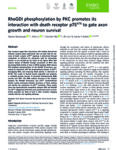January 11th, 2016 The NUS/UCL/KI Neuroscience Workshop 2016 is a 2-day symposium and workshop organised by NUS during 25-26 January featuring neuroscientists from two major NUS partner universities, University College London and Karolinska Institute in Stockholm, as well as local speakers from NUS, Duke-NUS, A*STAR, NNI and NTU.
For more information and registration please visit the Workshop website.
December 9th, 2015 Our latest paper describes new NMR structures of the death domain in complex with downstream interactions RhoGDI and RIP2 as well as the death domain dimer. These are the first structural insights into p75NTR signaling and reveal many surprises for the death domain superfamily. The paper is now available online at eLife.
Death domains (DDs) mediate assembly of oligomeric complexes for activation of downstream signaling pathways through incompletely understood mechanisms. We report structures of complexes formed by the DD of p75 neurotrophin receptor (p75NTR) with RhoGDI, for activation of the RhoA pathway, with caspase recruitment domain (CARD) of RIP2 kinase, for activation of the NF-kB pathway, and with itself, revealing how DD dimerization controls access of intracellular effectors to the receptor. RIP2 CARD and RhoGDI bind to p75NTR DD at partially overlapping epitopes with over 100-fold difference in affinity, revealing the mechanism by which RIP2 recruitment displaces RhoGDI upon ligand binding. The p75NTR DD forms non-covalent, low-affinity symmetric dimers in solution. The dimer interface overlaps with RIP2 CARD but not RhoGDI binding sites, supporting a model of receptor activation triggered by separation of DDs. These structures reveal how competitive protein-protein interactions orchestrate the hierarchical activation of downstream pathways in non-catalytic receptors.
December 2nd, 2015 Senior RF Lin Zhi, NMR wizard and first lab member to be hired at our NUS lab, moves on to initiate his independent career after successful postdoc period at the lab. Lin Zhi will be group leader at Tianjin University in China. He remains a Visiting Research Fellow of our Department and we look forward to continued collaborations with him. All the best for you Lin Zhi!
November 2nd, 2015 Eunice Sim holds a Bachelor in Science from the University of Western Australia. Until recently, she worked as Senior Laboratory Officer at the Advanced Molecular Pathology Laboratory of the Institute of Molecular & Cell Biology, A*STAR, Singapore. Eunice joins the NUS group to assist with various technical tasks, including mouse genotyping and histological analyses.
August 3rd, 2015 Ee-Soo Lee obtained a PhD from the University of Groningen, The Netherlands, under the direction of Prof. Martin Harmsen. Her doctoral studies were based on investigations of the interplay between TGF-β and fluid shear stress in regulation of endothelial cell phenotype and functions, in the context of oxidative stress and cellular senescence. Ee-Soo is joining our nascent metabolism team to focus on studies at at understanding the signaling mechanisms by which teh action receptor ALK7 regulates catecholamine sensitivity in adipocytes.
Chang Liu defended her thesis at the University of Sydney, Australia, under the direction of Prof. Jürgen Götz. Her doctoral studies were aimed towards addressing the distribution and physiological function of tau isoforms using tau isoform-specific monoclonal antibodies. Liu is joining our NUS group to lead a new line of research aimed towards the elucidation of the roles of neurotrophin signaling in cerebrovascular disease, focusing on their actions on cellular elements of the brain microvasculature under normal conditions and following cerebrovascular damage and AD-related neurodegeneration.
August 1st, 2015 A Research Assistant/Associate is currently being recruited to our laboratory in the Centre for Life Sciences, NUS campus. The successful candidate will be a dynamic, service-minded person, with a solid research background in molecular biology, tissue culture, histological techniques and/or mouse genetics methods. He/she will have a strong presence in the laboratory by assisting the group by with experimental lab routines, including maintenance of mouse colonies, genotyping, molecular biology and cell culture experiments, as well as conducting research together with other lab members or independently.
Work at the laboratory focuses on understanding the functions and �signaling mechanisms of neuronal growth factors and their receptors in neural development, �injury responses and metabolic regulation, for the development of �better therapies to diseases of the nervous system and metabolism.
Applications including CV and names plus email addresses of three referees should be sent by email before August 20 to Prof. Carlos Ibanez  . .
UPDATE (09/2015): this position has been filled.
June 1st, 2015 Raj Kamal Srivastava obtained his PhD in 2008 at the Department of Zoology, Faculty of Science in Banaras Hindu University, Varanasi, India. He did postdoctoral studies at the Institute for Physiological Chemistry and Pathobiochemistry, Johannes Gutenberg University of Mainz, Germany. His studied the role of central and peripheral CB1 receptor in obesity and behavioral disorder using transgenic mouse lines deleted for CB1 receptor in adrenergic and noradrenergic neurons, CamK2a expressing neurons, and adipocytes. CB1 receptor deletion from adipocytes revealed a significant role of the brain-sensory-adipocyte axis in obesity. The data highlight the role of CB1 receptor in sympathetic activity, food intake and stress induced obesity. At the NUS lab, Raj will lead studies on the roles of activin receptors ALK4 and ALK7 in adipogeneiss, adipose tissue homeostasis and obesity.
March 5th, 2015 In our latest paper, we show that the p75 neurotrophin receptor p75NTR can signal very differently in diferent types of neurons. Using pharmacological and genetic techniques, we demonstrate that this is partly controlled by differential proteolytic cleavage of the receptor in different cell types. The new work has appeared online in the Journal of Cell Science.
Signaling by the p75 neurotrophin receptor (p75NTR) is often referred to as cell-context dependent, but neuron-type specific signaling by p75NTR has not been systematically investigated. Here, we report that p75NTR signals very differently in hippocampal neurons (HCNs) and cerebellar granule neurons (CGNs), and present evidence indicating that this is partly controlled by differential proteolytic cleavage. NGF induced caspase-3 activity and cell death in HCNs but not in CGNs, while it stimulated NFκB activity in CGNs but not in HCNs. HCNs and CGNs displayed different patterns of p75NTRproteolytic cleavage. While the p75NTR carboxy terminal fragment (CTF) was more abundant than the intracellular domain (ICD) in HCNs, CGNs exhibited fully processed ICD with very little CTF. Pharmacological or genetic blockade of p75NTR cleavage by gamma-secretase abolished NGF-induced upregulation of NFκB activity and enabled induction of CGN death, phenocopying the functional profile of HCNs. Thus, the activities of multifunctional receptors, such as p75NTR, can be tuned into narrower activity profiles by cell-type-specific differences in intracellular processes, such as proteolytic cleavage, leading to very different biological outcomes. Read the full article HERE.
February 26th, 2015 The Department of Physiology of the Yong Loo Lin School of Medicine at National University of Singapore has immediate opening for postdoctoral positions in Neuroscience, with specialization in Brain Vascular Biology. As part of a University-wide initiative on mechanisms of neuronal and synaptic injury in ageing and neurodegenerative diseases under the direction of Profs. Carlos Ibanez and Edward Koo, we are seeking talented and enthusiastic individuals to join our laboratories for postgraduate training.
Under the direction of Drs. Carlos Ibanez and Edward Koo, this project will focus on studies of the role of BDNF signaling in physiological and injury responses of cellular elements of the brain vascular system. More information about these laboratories can be found HERE and HERE. This is an exciting opportunity for individuals who have received a doctoral degree within the past five years and with a strong background in vascular biology or cellular neurobiology to receive further training in basic and translational studies in neurodegenerative diseases.
Requirements:
- Doctoral degree (PhD) in biological sciences
- Experience on mouse models and neuroscience research
- Experience on vascular biology studies is preferred
- Able to work independently with precision and possess good organizational skills
Our labs are located on the Medical School campus of the National University of Singapore. There is close integration among the core laboratories of this University supported strategic initiative in neuroscience. This provides for an exciting environment to pursue neuroscience research and a great opportunity for Singaporeans, Asian expats wishing to return somewhere closer home, or anyone interested in experiencing the Asian culture, in one of the most developed and exciting countries in the region.
Interested individuals should send application including cover letter, curriculum vitae, statement of research interests, and contact information, and provide names of three references to Prof. Carlos Ibanez  . .
Deadline is March 20, 2015.
February 6th, 2015 TGFbeta Superfamily Signaling in Adipocytes
Work at Carlos Ibanez laboratory focuses on understanding the functions and signaling mechanisms of growth factors and their receptors in nervous system function and metabolic regulation, for the development of better therapies to neurodegenerative and metabolic disorders. Carlos Ibanez is Professor at the Department of Physiology, Yong Loo Lin School of Medicine, National University of Singapore.
A postdoctoral fellow is currently being recruited to advance research on growth factor receptor signaling and function in metabolic regulation of fat deposition, adipose tissue function, CNS regulation of metabolism, and obesity. In our latest paper, we reported that the sensitivity of fat cells to signals that increase the breakdown of fat is linked to the TGFbeta superfamily receptor ALK7. This discovery, published recently in eLife (http://elifesciences.org/content/3/e03245), suggests that ALK7 is a promising new target for strategies to treat human obesity.
We are seeking talented, innovative and enthusiastic researchers with a PhD awarded within the last 5 years to elucidate adipogenic and homeostatic functions of ALK4 and ALK7 receptors in adipose tissue to advance novel therapeutic opportunities. We will only consider candidates with documented expertise in studies of intracellular signaling pathways, with preference for TGFbeta superfamily signaling and molecular/cellular endocrinology. Candidates lacking expertise in this area will not be considered.
Our group at NUS has linked up with a network of researchers studying metabolism regulation in Singapore. This provides for an exciting environment to pursue metabolism research and a great opportunity for Singaporeans, Asian expats wishing to return somewhere closer home, or anyone interested in experiencing the Asian culture, in one of the most developed and exciting countries in the region.
Applications, including CV, list of publications and statement of future interests should be sent to Prof. Carlos Ibanez ( ). Applicants should arrange to have at least two confidential letters of reference sent independently by referees to this email address. ). Applicants should arrange to have at least two confidential letters of reference sent independently by referees to this email address.
Funding is available for an initial period of 2 to 3 years, starting any time during 2015.
Deadline for application is March 1, 2015
|
|
|
Warning: Undefined array key "full_width_footer" in /customers/2/6/6/carlosibanezlab.se/httpd.www/NUS/wp-content/themes/atahualpa_3723/footer.php on line 93



